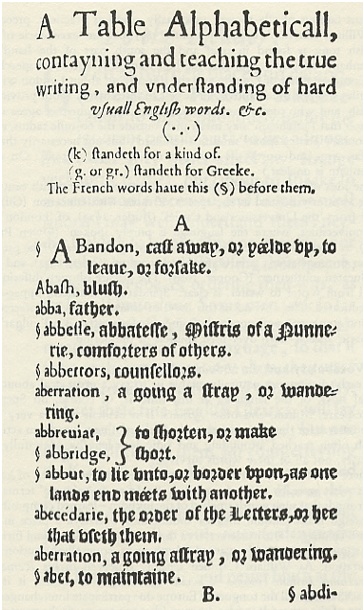My heart breaks somehow.
How late it was that the first English dictionary was published. 1604. Can you fathom how late that is? We’re talking well after Chaucer, and even after Shakespeare began. The microscope already had been invented. The MICROSCOPE, people.
Oh, words really flew back then. Spellings shifted like weather. Men signed their names in so many different ways. And books, wow, books… In the Middle Ages, books were so valuable that libraries chained books. Readers could pull the chain taut long enough to sit down nearby and read, but those valuable tomes never walked out into the dusty streets.
Your library is your portrait.
Our first English dictionary was called A Table Alphabeticall. With two Ls, that’s no error on my part.
The first word in the dictionary was abandon. Abandon. What a sad, sad, sad word to start such a vital book, the sum of all our words.
Then again, it wasn’t ever really envisioned as a compendium of all of our words. Its 2,543 words were selected for a very specific purpose. It was intended for “ladies, gentlewomen, or any other vnskilfull persons,” so that they could “more easilie and better vnderstand many hard English wordes, vvhich they shall heare or read in scriptures, sermons, or elswhere, and also be made able to vse the same aptly themselues.”
Generous, hm?
The author, Robert Cawdrey, had been a rector before being forced out of his rectory for his Puritanical leanings, which emerged not least, as you can imagine, in his sermons. His youngest son would grow up to become a Puritan minister known for religious intolerance. Apparently he believed religious toleration to be “the last and most desperate sign of the Antichrist.”
There’s only one surviving copy of the original Table Alphabeticall. It’s in Oxford. I’d love to see it. To see it, touch it, and turn its pages. If only it could survive the treatment.
Think of it. It not only contains words we may not use today, it also includes meanings that we’ve forgotten.
Geometry, for example, is listed as “the art of measuring the earth.” How magical is that.


This was a mucho cool post. I love learning new facts like this.
All through high school and university, it’s always been the cool magical moments or trivia hawtness that I’d remember. Years of history classes, but as an adult I’m still trying to piece together the overall trends and whatnot. But the trivia, that’s what sticks… 🙂
Oh that’s interesting!
But then the meanings of the words are constantly shifting to fit the current culture. Words and meanings are lost while new ones are created (Shakespeare’s a huge perpetrator of the latter, if I remember correctly). In the future, we’ll have to include all the “w/e”s, “lol”s into the dictionary as well.
“She loled at the mess the cat got into.”
Yikes.
*Shudder*
I must confess, you may have driven me to drink with this post, Dnic 🙂 I pray that “lol” never makes it into any Table Alphabeticall. Seriously, I think we all need to take a quiet moment on our knees or hugging a tree or whatever, and just focus, focus this one wish out into the universe…
🙂
Thanks for coming by and posting, Dnic! And yeah, words, they are a’changin’!
Ah, the way of the Word. I first learned of it’s infinite mutability while reading Don Quijote. My outlook on works has never been the same.
There’s a great Japanese (or Chinese?) haiku I used to love, which didn’t use a single word in its customary role (ie verb, noun, adjective), yet the image was vivid, crisp and clear. It was incredible. I wish I’d not lost it…